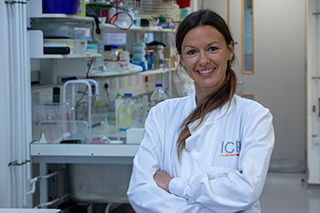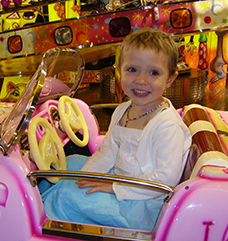“Our dream of making neuroblastoma survivable looks like it could come true.” Abbie’s father Mike explains why new hope of personalised treatments is within reach.
Cancer research must not stop for the coronavirus
Like so much in our lives, our research was put on hold in the spring due to the coronavirus lockdown. We are delighted to have our labs almost fully open again. Although we face uncertainty going into winter, we remain determined to push on because cancer research just can't wait. We know that cancer patients, more than ever, are relying on us to deliver better treatments.
This need is even more compelling for children with cancer.
In the UK, around 1,900 children aged 14 or under are diagnosed with cancer each year. Cancer in children is less well understood than other cancers, because we lack the tools to create accurate models of tumours, and clinical trials can be difficult to set up due to fewer patient numbers and the diverse nature of the disease.
While survival rates for these children are improving, we know there is still much more to do. Children who die from cancer often do so because their disease has evolved to become resistant to their treatment. Tumours that come back are typically difficult to treat, with options usually limited to chemotherapy and radiotherapy – both of which can cause terrible side-effects for young children.
Using cutting-edge models to bring personalised treatment to children with cancer

Dr Alejandra Bruna recently joined us as Team Leader in Preclinical Modelling of Paediatric Cancer Evolution. Based in our new Centre for Cancer Drug Discovery, her team aims to understand how cancer adapts to its environment and evolves resistance to treatment.
Dr Bruna’s team will use new laboratory models derived from patients’ tumours, which capture the features of the original cancer. They will study how different cells from the same tumour can vary so much, and the role of evolution in the development of resistance to treatment.
These laboratory tools can be used as a patient’s tumour alternative reality or an ‘avatar’. With these avatars, the team can recreate the complexity of a child’s cancer in the lab and test many different drugs – it’s the same tumour studied in parallel universes. This will maximise the possibility of finding the right treatment for that young patient.
These avatars are at the frontline of personalised cancer medicine. Please donate this Christmas
to help us bring precision medicine to children who urgently need it.
Donate now
“Our dream of making neuroblastoma survivable looks like it could come true.”

Abbie Shaw was diagnosed with adrenal neuroblastoma at just 21 months old. She underwent operations, multiple rounds of high-dose chemotherapy, a stem cell transplant, immunotherapy, radiotherapy and other hard-hitting treatments. She had periods of being cancer-free but ultimately none of the treatments were successful for long. She died aged five years old.
Dr Bruna hopes that her research will benefit children like Abbie in the future. Abbie’s dad, Mike Shaw, who generously supports our work through Abbie’s Fund, says: “We are very proud to contribute to the fantastic work being undertaken by the ICR. We have been involved since 2005 and in that time unbelievable progress has been made in both the understanding and treatment of this horrendous cancer. The dream we had of making neuroblastoma survivable now looks as if it could genuinely become reality."
Dr Alejandra Bruna, Team Leader, Preclinical Modelling of Paediatric Cancer Evolution
'For me, this research is very personal. I was 13 when my dad was diagnosed with a rare type of leukaemia. He survived for 9 years after his diagnosis, but only after very gruelling treatment.
“Now, as a mother of two and a scientist, I want to dedicate the rest of my professional career to helping patients avoid non-beneficial and harmful treatments. This is particularly important for children, when they are given harsh cancer treatments designed for adults.
I would be so grateful if you would make a donation to our research today. Your support for our work is more important than ever following the impact of the pandemic, as our research funding is being affected by cuts and fundraising events are cancelled.”
Donate now